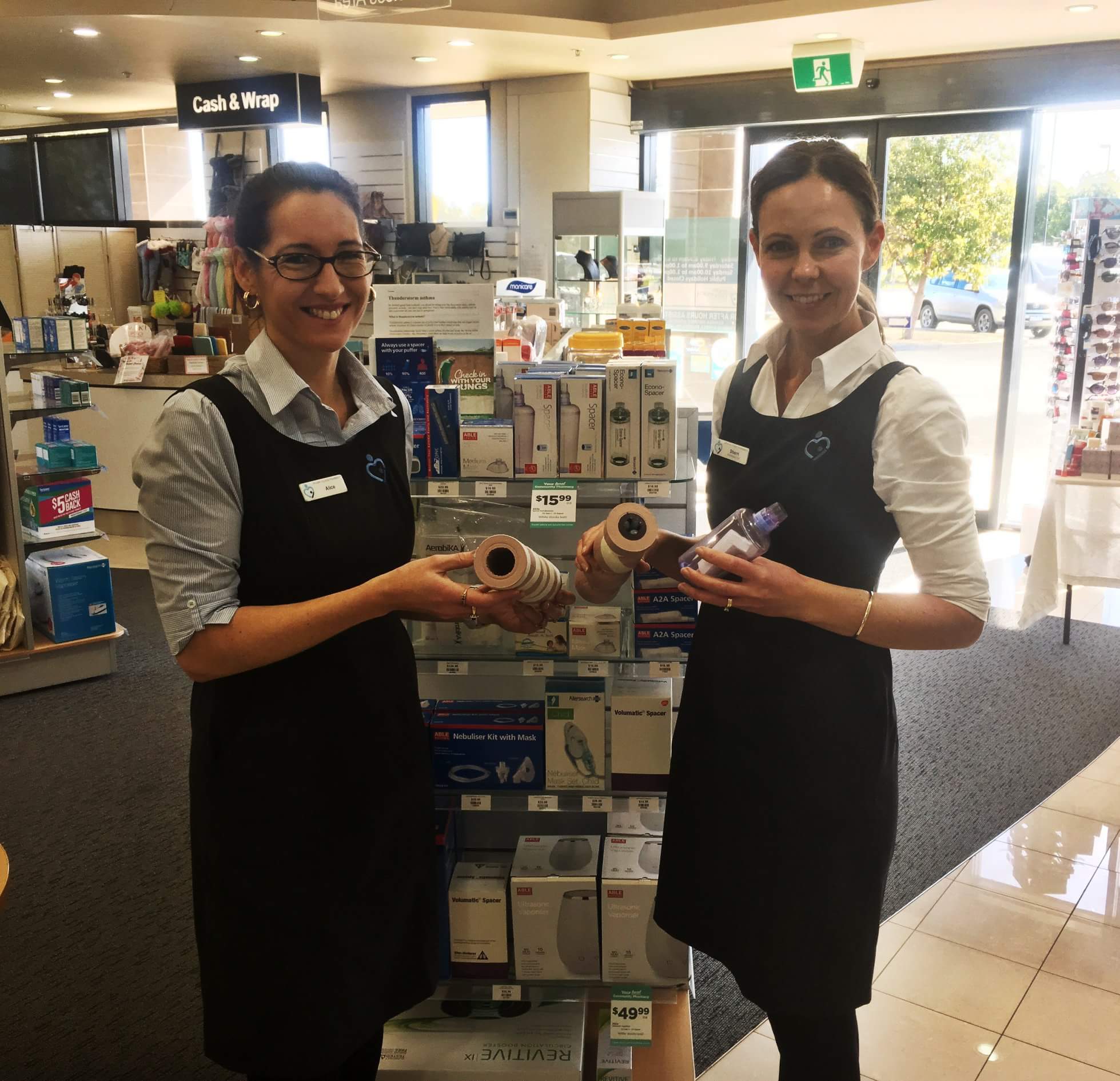By Alice Vanderpol, 2018 Pharmacy Assistant of the Year
Asthma is a chronic disease of the airways that makes breathing difficult. In 2017, Asthma Australia reports there were 441 deaths due to asthma. As staggering as this statistic may sound, the amount of deaths today has actually dropped significantly from 1989 where it peaked at 964. The reduction in deaths is thanks to General Practitioners and Asthma Educators creating awareness of the disease.
Asthma Educators are revolutionising the lives of people living with asthma and I am lucky enough to know one. Sherri Barden – Asthma Educator & Pharmacist – has taken the time to sit down with me to share some of her amazing knowledge and insights into the Asthma Trial she is currently conducting at Moama Village Pharmacy.
Hi Sherri! Thank you for taking the time to speak with me. First off, I’d love to know a little bit more about you and how your pharmacy journey started to where you are today.
Hi Alice, thanks for having me! My Aunty asked if I had considered pharmacy as a career when I was in Year 9 and I hadn’t at that point. After that, I decided to do work experience in Year 10 at a hospital and retail pharmacy in Echuca. I was then offered a position as a junior retail pharmacy assistant. This exposure made it an easy career decision for me and one that I have never regretted.
I completed my Bachelor of Pharmacy at Monash University in Melbourne and my internship year at the Royal Children’s Hospital. Since then, I have worked in community pharmacy in mostly regional/rural pharmacies around Australia. I have been at Moama Village Pharmacy part time for almost five years.
Why did you decide to become an Asthma Educator & Pharmacist? How did this all come about?
Mostly due to my family history and a customer’s tragic experience with asthma. Their 16 year old, fit grandson died from asthma and that really impacted me. Alarmingly, 90% of patients use their inhalers incorrectly and I knew that I could make a difference if I really focused and specialised in the area. I remember I was at a professional development session one night on asthma and I said to my boss that I would like to be an Asthma Educator & Pharmacist. He said yes and booked me into the course the following week.
I’d love to know more about the disease Asthma. Do you think Australians take the disease seriously enough?
Asthma affects 1 in 9 Australians. Asthma is a chronic condition of the airways which can cause symptoms such as wheezing, coughing, shortness of breath and tightness of the chest. Asthma is reversible and variable which means that a person’s lung function can be normal between exacerbations (when not exposed to triggers). Asthma patients have hypersensitive airways, so that when exposed to a trigger (such as dust, smoke, pollen or a chest infection), the lungs in response become inflamed, tighten and produce mucous and the symptoms of asthma.
Approximately 400 Australians die each year of asthma. I don’t believe Australians take the disease seriously enough and often underestimate its severity.
What does it take to become a qualified Asthma Educator? Can you take me through the process? Can anyone become one?
Any health professional can become an Asthma Educator. It’s a three day course run by the Lung Health Promotion Centre at the Alfred Hospital in Melbourne. The three day course covers the latest advances in management and care, providing the knowledge and skills to work effectively with people who have asthma to improve their management and health outcomes. There is a written assessment component also.
Currently you are involved in an Asthma Trial. Can you tell me more about this? How many pharmacies are in the trial? Is anyone allowed to participate in the trial and how can you become eligible?
The Asthma and Allergic Rhinitis Trial is a study commissioned by the Department of Health and is being conducted by the Woolcock Institute of Medical Research in collaboration with The University of Sydney, Curtin University, University of Tasmania, The Pharmacy Guild of Australia and the Pharmaceutical Society of Australia.
A total of 94 pharmacies and 386 patients across three states have been recruited into the trial. To be eligible, patients had to be over 18 years old with uncontrolled asthma and allergic rhinitis (hay fever). There are two arms of the trial with differing intervention. Our pharmacy is in Group A which involves a baseline, 1 month and 12 month visit with the patient in the pharmacy, and a phone call at 6 months.
What’s the point of the trial and what do you hope to take away from this?
The point of the trial is to see if pharmacy intervention through education and support can have an impact on the quality of life and self-management of patients living with uncontrolled asthma and hay fever. It’s a great way to create awareness of the condition. It also gives customers a safe space to sit down with an Asthma Educator & Pharmacist to receive free education and advice.
What’s next on the agenda for you?
A more structured follow up with patients after I have seen them in the pharmacy for asthma education. I am also currently involved in the Chronic Pain MedsCheck Trial in pharmacy which I am thoroughly enjoying.
Thanks for your time Sherri!
Did you know the Pharmacy Assistant National Conference (PA2019) provides specialised sessions on asthma and allergic rhinitis, as well as other pharmacy knowledge, management and operation topics? PA2019 will be held from 11-13 October at the Sofitel Brisbane Central. Pharmacies who send two or more staff will receive a free APP2020 registration valued at over $1,000. For more information and to register, visit www.pharmacyassistants.com.

